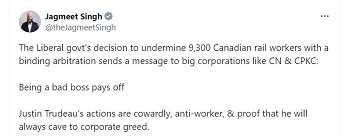Federal Labour Board orders rail workers back on the job on Monday after four days of strike
TORONTO – In the end, almost a day after the start of the widely announced railway strike, the largest in the history of Canada, the federal government “woke up”: on Thursday evening, when the country was already effectively paralysed, the Federal Labor Minister, Steve MacKinnon, has announced he will use powers under the Labor Code to “ensure industrial peace” and to impose binding arbitration. Calmly, only on Saturday, the Federal Labor Board followed up on the minister’s announcement by establishing that freight trains will have to start running again on Monday morning (tomorrow, after four days of stoppage), thus ordering thousands of railway employees to return to work and to interrupt the strike called following the bitter contractual dispute between the union (Teamsters) and the country’s two main railways: Canadian National Railway (CN) and Canadian Pacific Kansas City (CPKC).
However, the issue may not be definitively resolved, since the Teamsters union representing the workers of both companies has committed to filing an appeal in court, arguing that the matter “sets a dangerous precedent”. As Paul Boucher, president of the Teamsters Canada Rail Conference, said, “Canadian workers’ rights are being significantly curtailed today”.
In the pic above: a Teamsters “picket” in front of the CPKC headquarters in Calgary, with François Laporte, president of Teamsters Canada, and Sean O’Brien, president of the International Brotherhood of Teamsters – IBT (photo from Twitter – @TeamstersCanada)
However, economic damage remains due also to the hesitation of the federal government, which waited until the strike began to intervene: according to the Railway Association of Canada, the critical transport lines affected by the closure carry goods worth over 1 billion of dollars every day; furthermore, more than 32,000 rail commuters in Montreal, Vancouver and Toronto are affected by the stop; even if the strike ends tomorrow, there will still have been four days of stoppage. And the complete resumption of transport will take several weeks. Not only that: in reality, the gradual closure of both railways had begun about two weeks ago and as the negotiation clock ticked towards the strike, transporters became more cautious, leaving their cargoes – from meat to medicines, as well as dangerous goods – stuck on the tracks in the event of a work stoppage. And the federal government was largely aware of all this.
Finally, a curious note at the very least. The leader of the NDP, Jagmeet Singh, who – with his votes – keeps Justin Trudeau’s minority Liberal government alive, published one fiery posts (here below, the screenshot) against “his” prime minister on X – Twitter, after the order to suspend the strike. “The Liberal govt’s decision to undermine 9,300 Canadian rail workers with a binding arbitration sends a message to big corporations like CN & CPKC: Being a bad boss pays off Justin Trudeau’s actions are cowardly, anti-worker, & proof that he will always cave to corporate greed”. Question: why Singh and the NDP still support the Trudeau government?




